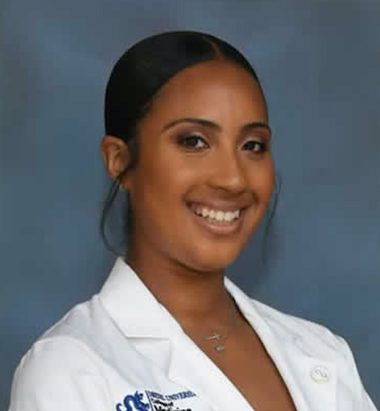
Hometown: Queens, NY
Undergraduate: Binghamton University, Bachelor of Science
Graduate: Drexel Pathway to Medical School (DPMS)
Can you tell me a little bit about yourself before you came to Drexel?
Before I came to Drexel, I attended Binghamton University for my undergraduate studies. I majored in Integrative Neuroscience, which was a mixture of biology, chemistry and psychology courses. I also minored in Theater with a concentration in Dance studies.
After receiving my bachelor's degree, I worked as an Applied Behavioral Analysis therapist for children on the autism spectrum. I worked with young children between the ages of 5 and 10, implementing individualized academic, behavioral and social programs. Each child had their own program, the goal of which was to develop skills they were struggling with at school or at home. I worked closely with the kids' families and a board-certified behavioral analyst to make sure I was executing each program effectively, and that I was aware of any concerns with the child's progress, so I could center them in the programs each week. When I was not working, I traveled to various places outside the country to learn more about different cultures around the globe. I visited Honduras, Thailand and Greece, among other places.
What drew you to medicine in general, and to the College of Medicine specifically?
One of the things that specifically drew me to the College of Medicine was the post-baccalaureate program, Drexel Pathway to Medical School (DPMS). This is a one-year masters and conditional acceptance program that is geared toward students from underserved and underrepresented communities in medicine. If DPMS students meet the required academic and professional benchmarks, they can matriculate into the MD Program. This program ensures that students are academically prepared to continue onto medical school coursework.
As a minority myself, I knew this would be the perfect program for me; it would help enhance my previous academic background and help me to be fully successful in medical school. DPMS prepared me 100 percent for the rigorous amount of coursework in medical school. Even though I had an amazing foundation from my undergraduate institution, I believe that DPMS fully expanded my scientific knowledge and helped me better prepare for medical school.
What organizations, extracurriculars, research, or community service experiences have you been involved in at Drexel? How have they impacted your experience here?
During my time at Drexel, I have been very involved in multiple activities across campus. I am co-President of the College of Medicine chapter of the Student National Medical Association (SNMA), a national organization focused on cultivating the next generation of minority physicians through workshops, conferences and networking. SNMA is also concentrated on addressing the needs of underserved communities. Through SNMA, I have been able to work closely with administration and faculty to create a healthy environment here at Drexel that is inclusive to all students from varied racial backgrounds and ethnicities.
I am also a patient advocate for the community service organization Health Outreach Project (HOP). I volunteer at the Eliza Shirley House, which is a family shelter located in the heart of Center City. I speak with the patients at Eliza about their concerns, medical or non-medical, and let them know about nearby resources that are available to them for free or at a low cost.
I love being involved in the Drexel community, and with the many organizations and clubs to choose from, it has very easy.
Please tell me more about your experience as the co-president for the College of Medicine's SNMA chapter. Where does your passion for that work come from?
I am extremely passionate about SNMA because of its mission to support the communities I come from. There is still only a small percentage of African-American physicians in the U.S. and SNMA strives to increase this percentage year by year through their varied programming. For decades, SNMA has been working to level the playing field for minorities in medicine and to be a resource for medical students from underrepresented communities; I hope to continue to be part of their amazing work.
What advice would you give someone who is thinking about pursuing a medical degree?
The biggest advice I would give to someone trying to pursue a medical degree is to remember that this process is a marathon and not a sprint. There are going to be many ups and downs throughout your journey to becoming a physician and it is important to never give up on yourself in those difficult times. Try to stay focused on your goal and consistently remind yourself why you want to be a physician; let that motivate you throughout this demanding process.